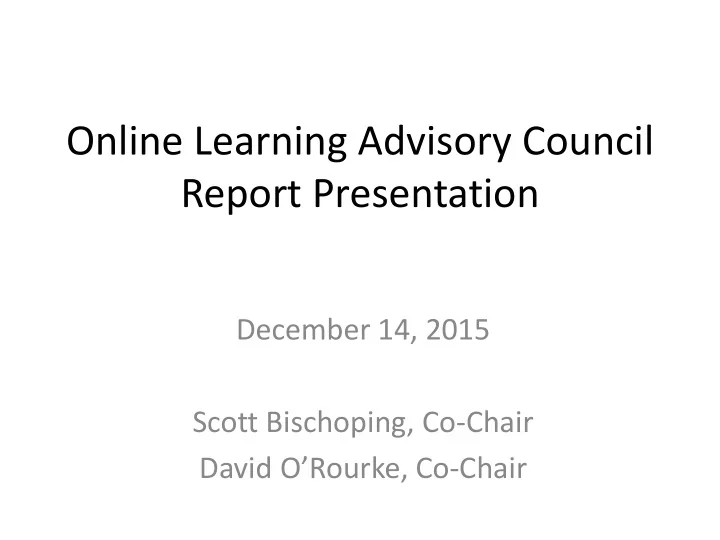

Online Learning Advisory Council Report Presentation December 14, 2015 Scott Bischoping, Co-Chair David O’Rourke, Co -Chair
Online Learning Advisory Council Timeline Statute • Signed - 2014 • Members appointed by Senate, Governor, and Commissioner of Education by July 2015 • Draft Recommendations due October 1, 2015 Council Modification • Draft delivered to Senate, Assembly, Governor and NYSED October 1, 2015 • Comment period October 1-November 6 • Final Report delivered to Senate, Assembly, Governor, and Commissioner of Education on November 12, 2015
Members of the Online Learning Advisory Council • Scott Bischoping , District Superintendent, Wayne-Finger Lakes BOCES • Dr. David O’Rourke , District Superintendent, Erie 2-Chautauqua- Cattaraugus BOCES • Paul Gasparini , High School Principal, Jamesville-Dewitt School District • Elizabeth Hardy , Staff Specialist for Distance Learning, Cattaraugus Allegany BOCES • Benjamin Higgins , District Technology Integration Specialist, Springville Central School District • Dr. Ellen Meier , Associate Professor of Practice Computing and Education and Director of the Center for Technology and School Change, Teacher’s College at Columbia University • Dr. Alexandra Pickett , Director, Center of Online Teaching Excellence, SUNY Learning Network • Marc Roennau , Computer/Business Education Teacher, Saunders Trades and Technical High School • Thomas Via , Special Education Teacher, Plattsburgh City School District
Purpose of Online Learning Advisory Council 5 Recommendations Required in Statute: 1. Guidance for use of a statewide online and blended learning network; 2. Best practices and model school district policies to inform implementation of an online and blended learning program, including broadband access; 3. Academic programming suited for online and blended learning; 4. Partnerships with institutions of higher education and other relevant stakeholders for workforce opportunities using online and blended learning; and 5. A review of teaching and professional development policies and practices.
Our Council’s Process • Phone conferences and face to face meetings • Sub-Committee foci: o Professional Development o Regulation and Statute o Virtual Learning • Consultations with Agencies and Higher Education Experts • Research with Northeast Regional Educational Laboratory (NEREL) • Meetings with constituent groups
Areas Necessary for Online and Blended Learning Program Development: 1. Institutional Vision and Support for Standards for Online Learning 2. Professional Development for Teachers and School Leaders 3. Content and Curriculum 4. Equipment 5. Internet Connectivity 6. Models of Quality Programs and Practices 7. Research, Evaluation, Program Assessment and Systemic Learning
Online Learning Advisory Council’s Major Recommendations 1. Funding for Professional Development 2. Empowering Innovation Networks 3. Capacity and Resources for Education Technology Leadership and Support at SED 4. Inclusion of Online Education Experiences in Teacher Pre-service Programs
Important Considerations • Did not recommend an online course requirement for graduation • Did not recommend one source/vendor for online learning, instead supporting expansion and funding current and new models • Although generated by Rural Resources Commission – need is not only rural, not geographical
In a recent survey, Middletown City School District found that: • 95% of its teachers using blended learning are better able to personalize learning; • 91% of teachers say they are more effective in the classroom now than before blended learning; • 89% report seeing an increase in student engagement; and • 77% feel very effective or effective at small group instruction using digital content.
Questions or Comments
Recommend
More recommend